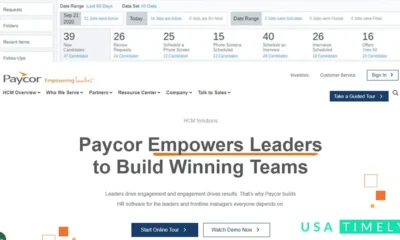Business
Best Business Certifications in 2024
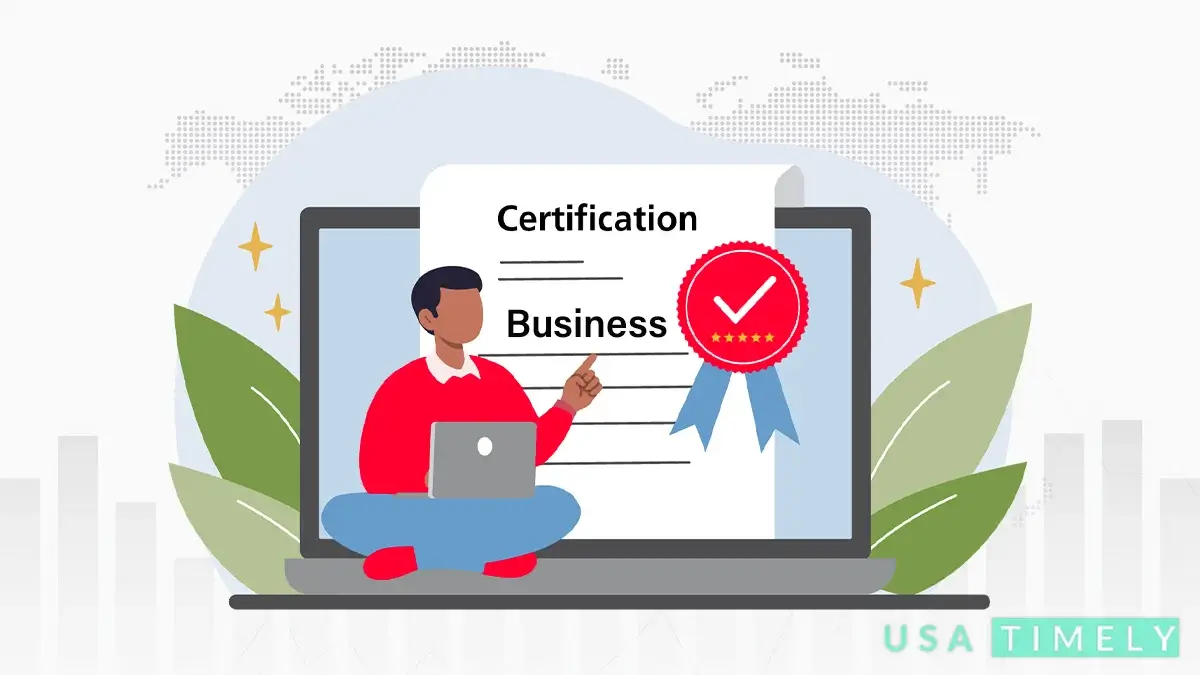
Business professionals often change positions to improve their salary, benefits, and career prospects. Getting business certifications is a great way to facilitate this change.
Defining a “business certification” can be challenging. To narrow down our alternatives, we considered general business and management credentials, as well as certificates in customer resource management (CRM), supply chain, sales, and purchasing. Most of the certifications we chose are vendor-agnostic, meaning they are not tied to a specific system or application. We researched various credentials from companies like SAP, SAS, and similar ones that specialize in business applications.
Best Business Certifications
Certified Associate in Project Management (CAPM)
The Project Management Institute (PMI) has been helping business professionals develop their careers in project management since 1969, mainly through professional development and certifications.
The CAPM is designed for aspiring project managers. To qualify, you need to demonstrate proof of a high school diploma, GED, or global equivalent. The exam consists of 150 questions, costs $225 for PMI members or $300 for nonmembers, and is available through Pearson VUE. Before taking the exam, you must have completed 23 hours of project management education. The certification is valid for five years, after which you must retake the exam to maintain it.
PMI also offers other certifications for the business community, such as the Project Management Professional (PMP), PMI Professional in Business Analysis (PMI-PBA), Portfolio Management Professional (PfMP), Program Management Professional (PgMP), and PMI Scheduling Professional (PMI-SP).
Certified Business Analysis Professional (CBAP)
The CBAP, offered by the International Institute of Business Analysis (IIBA), is an advanced certification for managers and leaders with more than five years of business analysis experience. You need at least 7,500 hours of business analysis experience over the last decade, with 900 hours directly related to four of the six BABOK Guide knowledge areas. Additionally, you need at least 35 hours of professional development credits earned over the last four years, plus two references.
The CBAP exam consists of 120 multiple-choice questions based on scenarios and case studies. It is available through PSI and costs $350 for IIBA members or $505 for nonmembers, with a $145 application fee. To maintain the CBAP, credential holders must complete at least 60 continuing development units within three years of certification.
The IIBA also offers related credentials, such as the Entry Certificate in Business Analysis (ECBA), Certificate of Capability in Business Analysis (CCBA), Agile Analysis Certification (IIBA-AAC), and Certification in Business Data Analytics (IIBA-CBDA).
Certified Supply Chain Professional (CSCP)
APICS focuses on supply chain management and offers the Certified Supply Chain Professional (CSCP) along with a few other certifications. The CSCP covers supply chain concepts and technology, as well as strategies for end-to-end operations, from supplier to company to consumer.
To obtain the CSCP, you must have a bachelor’s degree or equivalent, at least one previous authorised certification, and three years of relevant business experience. In addition, you must pass an exam that costs between $1,365 and $1,900, depending on your APICS membership status.
Project Management Professional (PMP)
The PMP certification from PMI is highly regarded in both business and IT industries. The requirements are rigorous. Option one requires a high school diploma, associate degree, or global equivalent; 60 months of experience leading projects; and 35 hours of project management education. Option two requires a four-year degree, 36 months of leading projects, and 35 hours of project management education.
To earn the PMP, you must pass a 180-question exam, which is available through Pearson VUE. The exam costs $405 for PMI members and $575 for nonmembers. To maintain the PMP certification, you need to earn 60 professional development units every three years.
SAP Certified Application Associate – CRM
The SAP Certified Application Associate – CRM recognizes a consultant’s skills in understanding and using SAP CRM software, including its integration with other SAP solutions like NetWeaver. SAP recommends that candidates have a combination of experience and training before taking the certification exam. Training courses are available if needed.
The exam consists of 80 questions and costs between $208 and $519, depending on the number of attempts you want. You can take the exam through the SAP Certification Hub.
Salesforce Certified Administrator
Salesforce is a leading CRM platform used by companies worldwide for managing business operations and customer relationships. The Salesforce Certified Administrator certification program is designed to enhance your knowledge of the platform at an administrative level. The program requires you to take several classes and workshops before completing a proctored credential exam. The classes and exam typically cost a few thousand dollars.
Salesforce suggests that candidates seeking this certification should already have a decent understanding of the platform, as the certification builds upon existing knowledge of features and functions. Upon completing this program, Salesforce also offers the Advanced Administrator certification to further enhance your platform knowledge.
HubSpot Inbound Marketing
HubSpot is a CRM platform that assists businesses in managing their marketing, sales, and help desk operations. While the platform offers various functionalities, the HubSpot Inbound Marketing certification focuses on teaching how to leverage content creation, social media, and other inbound marketing strategies effectively.
The certification course is free and comprises seven lessons, including 24 videos and seven quizzes, taking nearly five hours to complete.
Oracle Certified Professional (OCP)
Oracle is a prominent cloud database software company that helps businesses apply digital concepts to various functions. Over 2.2 million people have earned their OCP credentials, and our initial research indicates over 1,000 job openings for this designation.
Oracle offers numerous certification paths covering its cloud-based and on-premises software and hardware solutions. The company provides free learning courses across a wide range of specialties. Once you feel prepared for the exam, you can purchase a voucher at prices ranging from $95 to $245. These vouchers remain valid for six months, giving you ample time to refine your skills with the Oracle platform before taking the test.
Job Site Search Results
Based on a snapshot of job listings as of March 13, 2023, the table below shows the demand for various business-related certifications on SimplyHired and LinkedIn Jobs:
| Certification | Simply Hired |
LinkedIn Jobs | Total |
| Certified Associate in Project Management (CAPM) | 929 | 1,976 | 2,905 |
| Certified Business Analysis Professional (CBAP) | 366 | 5,423 | 5,789 |
| Certified Supply Chain Professional (CSCP) | 647 | 1,029 | 1,676 |
| Project Management Professional (PMP) | 18,230 | 79,715 | 97,945 |
| SAP Certified Application Associate – Business Planning and Consolidation | 23,263 | 168,382 | 191,645 |
| Salesforce Certified Administrator | 636 | 38,055 | 38,691 |
| HubSpot Inbound Marketing | 728 | 101 | 829 |
| Oracle Certified Professional (OCP) | 400 | 645 | 1,045 |
Please note that these numbers represent the total number of open positions that specifically mention each certification. It’s important to remember that this data provides a general overview and is not a comprehensive analysis of every job listing available.
Important: Business certificates can help you succeed in your profession regardless of your industry.
Other Business Certifications to Consider
American Purchasing Society Certifications
The American Purchasing Society offers several certifications, including the Certified Purchasing Professional (CPP), Certified Professional Purchasing Manager (CPPM), Certified Green Purchasing Professional (CGPP), Certified Professional in Distribution and Warehousing (CPDW), and Certified Professional Purchasing Consultant (CPPC) programs.
Institute of Certified Records Managers (ICRM) Certifications
For professionals dealing with business records, the Institute of Certified Records Managers offers certifications such as the Certified Records Analyst (CRA) and Certified Records Manager (CRM) programs.
Institute of Management Consultants Certification
On a global scale, the Institute of Management Consultants provides the Certified Management Consultant (CMC) certification.
NASBITE’s Certified Global Business Professional (CGBP)
NASBITE’s CGBP certification focuses on global business management, marketing, supply chain management, and trade finance.
Business Relationship Management Institute (BRMI) Certifications
The Business Relationship Management Institute offers two certifications: the Business Relationship Management Professional (BRMP) and Certified Business Relationship Manager (CBRM).
These certifications can enhance your skills and credibility in various business fields.
Stay connected with USA Timely for more business tips!

Business
Best Business Podcasts for 2024

Entrepreneurs face a plethora of responsibilities, one of which is keeping abreast of the latest business insights and trends. While articles and online forums are valuable resources, podcasts offer a fresh and engaging way to gather business advice. With the sheer volume of podcasts and episodes available, selecting the most worthwhile ones can seem difficult.

After extensive research and hours spent listening, a curated list of exceptional business podcasts has been compiled. These are selections beyond the well-known programs like The Ramsey Show and Planet Money. Entrepreneurs are encouraged to explore these recommendations to enhance their business acumen, stay updated on trending topics and find ample inspiration.
“Tuning into a business podcast is like attending a masterclass in entrepreneurship, where each episode equips you with tools to navigate the complexities of the market and elevate your business acumen.”
1. 10 Minute MBA with Scott D. Clary
Hosted by investor and CEO Scott D. Clary, “10 Minute MBA” offers daily episodes that deliver concise, actionable business lessons. Despite its lengthy title, each episode is refreshingly brief, typically lasting no more than 10 minutes. These episodes provide practical insights, tools and strategies to help listeners start or expand their businesses. Beyond the podcast, Clary engages with a broader audience through his YouTube channel, which boasts over 50k subscribers and a newsletter with more than 100k subscribers. He also hosts “Success Story,” part of the Hubspot Podcast Network.
Available on:
- Spotify
- Apple Podcasts
2. The BizChix Podcast
“The BizChix Podcast,” led by Natalie Eckdahl, who holds an MBA, is tailored for women entrepreneurs ready to step into their roles as CEOs. Eckdahl’s approach combines expert interviews with her coaching skills, offering on-air coaching calls and business training. Episodes, which air weekly and last about 30 minutes, focus on topics like business leadership, mindset mastery, team-building, and balancing professional and home life. This podcast specifically addresses the unique challenges women in business face and offers strategies to manage them effectively.
Available on:
- Apple Podcasts
3. Business Accelerator
Business Accelerator hosted by bestselling author Michael Hyatt and CEO Megan Hyatt Miller, covers a broad spectrum of topics important for business leaders, including goal-setting, receiving feedback, personal growth, leadership and expanding business influence. The podcast’s weekly hour-long episodes are designed to enhance listeners’ productivity and leadership impact. The unique father-daughter hosting duo adds a dynamic touch, providing diverse business insights and perspectives.
Available on:
- Spotify
- Google Podcasts
- Apple Podcasts
4. Business Breakdowns
Business Breakdowns offers a unique educational experience by dissecting the operations of major companies. Each episode provides an in-depth analysis of a recognized firm, exploring its history, business model, financial health and organizational culture. The insights often come directly from company executives or industry experts, making the weekly one-hour episodes both authoritative and enlightening.
Available on:
- Spotify
- Apple Podcasts
- Amazon
- Podcast Addict
“Amazon has become a giant in the E-Commerce Industry. Take a closer look at how Amazon’s ownership and ownership structure have evolved over the years.”
5. Builders
Hosted by John Busby, the CMO of Centerfield, the builders podcast delves into the diverse strategies behind successful companies. Each week, Busby interviews leaders across various industries and company sizes, extracting key insights and innovative approaches to business. In collaboration with Marty Beckerman, editor-in-chief of the b. Newsletter, the show also tackles trending business topics. Each episode lasts about 30 to 40 minutes, and for those who prefer visual content, the podcast is also available as a video on YouTube.
Listen on:
- Spotify
- Watch on YouTube
- listen on Apple Podcasts
6. The Jasmine Star Show
Entrepreneur and business strategist Jasmine Star brings a personal touch to “The Jasmine Star Show,” where she converses with industry experts to share strategies for building and marketing a brand. The podcast, which features over 300 episodes, is known for its actionable coaching and detailed business tips. Star also connects with her audience through her YouTube channel, which has over 72,000 subscribers.
Available on:
- Spotify
- Apple Podcasts
- Amazon
- Audible
7. The Mind Your Business Podcast
James Wedmore’s “The Mind Your Business Podcast” is for CEOs looking to blend traditional business strategies with personal growth and mindset techniques to achieve success. The podcast features discussions with experts about finance, marketing, and unconventional methods like manifesting success. New episodes are released weekly, offering a mix of practical advice and transformative insights.
Listen on:
- Spotify
- Apple Podcasts
- Podbean
“Business people frequently switch jobs in order to advance their careers and receive better pay and benefits. Obtaining business certificates is an excellent method for assisting with this shift.”
8. The Miss Findependent Show
Nika Farb hosts “The Miss Findependent Show,” focusing on financial literacy for women. The podcast, which releases weekly episodes ranging from 30 to 60 minutes, covers topics such as investing, entrepreneurship and career development. Farb’s approach is tailored to empower women financially but is universally beneficial for all entrepreneurs. Additionally, Farb complements her podcast with a weekly newsletter, enhancing the educational experience.
Available on:
- Spotify
- Apple Podcasts
9. My First Million
Hosted by Sam Parr and Shaan Puri, “My First Million” captivates its audience with multiple episodes each week, enjoying a robust following of 250,000 subscribers. The podcast features lively discussions between Parr and Puri, who brainstorm business ideas and market trends aimed at helping listeners reach significant milestones, such as their first million in users, revenue or profit. Episodes, typically lasting between 45 minutes to an hour and a half, offer a dynamic mix of dialogue and insights, making each session feel like an interactive brainstorm rather than a conventional tutorial.
Available on:
- Spotify
- YouTube
- Google Podcasts
- Apple Podcasts
10. The Side Hustle Show
Nick Loper of Side Hustle Nation brings listeners “The Side Hustle Show,” an award-winning podcast that explores innovative ways to earn income outside of traditional jobs. Each episode, under an hour long, combines Loper’s expertise with interviews from seasoned side hustlers, delivering practical advice on what works (and what doesn’t) in side hustling. With more than 100,000 weekly listeners, the podcast resonates especially in today’s evolving job landscape, appealing to those looking to diversify their income streams.
Available on:
- Spotify
- Apple Podcasts
- Podbean
11. The UpFlip Podcast
For those curious about launching or acquiring a business, “The UpFlip Podcast” is an excellent resource. The show offers a peek into the real-world experiences of business owners, providing a platform for them to share their successes and challenges. Each episode, which averages 30 to 45 minutes, features interviews with entrepreneurs who discuss the nuts and bolts of starting and running a variety of business types. Additionally, UpFlip also serves those interested in buying or selling a business, making it a versatile tool for prospective and current business owners alike. With respect to USA Timely, one trending way of secure business making is investing in Digital Real Estate.
Available on:
- Spotify
- YouTube
- Apple Podcasts

These podcasts are just a few standout choices among many that can offer valuable insights into business development and entrepreneurial success in 2024. They each present a unique opportunities to learn and grow professionally, providing both guidance and inspiration to their listeners.
“Business podcasts are the modern entrepreneur’s textbook, offering lessons, insights and expert advice while on the go. They are an indispensable resource for anyone looking to turn ideas into action and dreams into reality.”
Business
Is this the Time to Hire a CPA? (Certified Public Accountant)

Thinking about handling your own taxes or using tax software? It might seem like a good idea, but there are better options. Hiring a certified public accountant (CPA) to handle your accounting and tax planning could be a plus. Sure, it’s an investment but the benefits can totally outweigh the costs. A CPA brings expertise and guidance to the table that can really help your small business thrive financially.
If you’re on the fence about whether to hire a CPA, here at USA Timely, you will find all your answers.
When to hire a CPA?
Thinking about when to bring in a CPA? Well, if you’ve got the budget for it, hiring one is probably your smartest move in every aspect. Trying to wrap your head around ever-changing tax laws, figuring out all the deductions you’re entitled to and keeping up with filings can really take you away from the main focus: running your business.
But, let’s talk specifics. You definitely want to consider hiring a CPA if:
- You don’t have a dedicated in-house accounting and finance team.
- You’re lagging behind on your taxes.
- You’ve got that gut feeling you might be audited. (Having a tax pro on your side can sometimes help dodge that bullet.)
- You’re gunning for outside funding or thinking about merging, and you need rock-solid financial statements just like an Audited Financial Statement.
- You’ve got suspicions about an employee or partner messing around with the books.
What to Consider While Deciding Who Should Do your Taxes?
Before you decide who’s going to handle your taxes, there are a few things you gotta think about:
- Check out where your business stands financially. Can you whip up accurate and complete financial statements and records? Sure, you might be able to, but think about the time it eats up and whether you could use that time for something else.
- How well do you know your personal income and your business’s income? Taxes can get real tricky for small business owners, so getting that income breakdown right is super important.
- Got a handle on your business’s accounting cycle? Do you know what it takes to keep your financials in check throughout the year?
- What’s your business’s legal setup? Depending on whether you’re a sole proprietorship, C-corp, S-corp, or something else, your tax situation can vary big time.
- How complicated are your revenue streams? If you’ve got a lot going on with your income sources, especially if they’re spread out across different places or industries, you might wanna lean towards hiring a CPA.
- Tax laws and regulations? Yeah, they’re a headache. They’re always changing and it’s tough to keep up. A CPA can help you navigate all that mess and make sure you’re not missing out on any deductions or breaking any rules.
- Is your business’s financial setup a bit of a maze? Maybe you’re dealing with tricky stuff like inventory or accounts receivable. A CPA can help sort through all that and make sure your taxes are on point.
As USA Timely explains: whether or not you decide to bring in a CPA, remember that taxes aren’t just a once-a-year thing. It’s a year-round deal, so staying on top of it is key to keeping your business running smoothly.
Hiring a CPA Pros & Cons
Pros of having a CPA on board
- CPAs are like the wizards of accounting. They’re pros at what they do, so you can bet they’ll make fewer mistakes than your average Joe. That means your business won’t get tangled up in any accounting nightmares down the line.
- They’re like money-saving superheroes. CPAs know all the ins and outs of the tax world, so they can help you sniff out every deduction and credit you’re entitled to. Plus, they’ll give you the lowdown on tax planning strategies that could save you big bucks.
- Time is money, right? Well, CPAs can save you a ton of both. Think about it: tackling your taxes solo can eat up hours and hours of your precious time. With a CPA handling it, you can kick back and focus on what you do best and this running your business.
- Ever had to deal with the IRS? It’s not fun. But having a CPA in your corner can turn the tide in your favor if you ever get audited or owe back taxes. They know all the tricks of the trade to minimize penalties, lower your tax bill and buy you more time to sort things out.
Cons of bringing in a CPA
- Alright, let’s talk money. CPAs don’t come cheap. With all their fancy education and certifications, they’re gonna cost you more than your average tax preparer or bookkeeper. For small businesses, that extra expense might be a tough pill to swallow.
- Remember tax season? CPAs sure do. It’s their busiest time of the year, which means they might be juggling a bunch of clients – including some who need help ASAP. So, if you’ve got burning questions or need your tax return done pronto, you might have to wait in line.
- Finding a good CPA can be like finding a needle in a haystack. There aren’t tons of them out there, especially if you’re searching at the last minute. So, if you’re thinking about bringing one on board, you better start your search early.
- Here’s the thing: CPAs are like the quarterbacks of the accounting world. They handle the big plays but you still need someone to handle the day-to-day stuff. That means you’ll probably still need to hire a bookkeeper to keep your financials in tip-top shape.
| Pros of Hiring a CPA | Cons of Hiring a CPA |
| CPAs make fewer errors | CPAs can be expensive |
| CPAs may be able to save you money | CPAs have busy schedules |
| CPAs can save you time | CPAs may be hard to find |
| CPAs are adept at dealing with the IRS | You must still handle day-to-day accounting |
Tips to Do your Company Taxes
When it comes to handling your business taxes, you’ve got a few options:
Do your business taxes yourself
If you’re up for the challenge and have a knack for numbers, you can tackle your business taxes solo. This option works well for business owners with a simple setup and a good grasp of tax basics. Mark Aselstine from Uncorked Ventures found that his straightforward business structure made it easier for him to handle his taxes on his own. He recommends trying out bookkeeping for a bit before making the switch from a CPA.
Pros of doing your own taxes with tax software
- It’s inexpensive
- Gives you control over your taxes
- Suitable for simple business models
Cons of doing your own taxes with tax software
- Less audit support than professionals can offer
- May require additional research
- Can’t override system defaults
Use a third-party tax service
If you’d rather not handle taxes yourself but don’t want to splurge on a CPA, a third-party tax service could be the way to go. Highly reputed companies can take care of your business taxes at a more affordable price point. Just keep in mind, you might not get the same level of financial analysis as you would with a CPA.
Pros of using a third-party tax service
- Reasonably priced
- Convenient
- Good for simple business models
Cons of using a third-party tax service
- Limited knowledge base
- Limited audit support
- May not offer customized calculations
Hire a CPA
Bringing in a CPA can be a game-changer for your business taxes. While it’s a pricier option, the expertise and peace of mind they provide are worth it for many business owners.
Pros of hiring a CPA
- Full audit support
- Expert knowledge of tax laws
- Help with business modeling
Cons of hiring a CPA
- Expensive
- By appointment only
- May be overkill for simpler businesses
| Aspect | Doing your own taxes with tax software | Using a third-party service | Hiring a CPA |
| Price range | Inexpensive | Moderate | Expensive |
| Audit support | None | Limited | Full |
| Availability | Anytime | By appointment only | By appointment only |
| Taxes done for you | No | Yes | Yes |
| Help with business modeling | No | No | Yes |

“Consider hiring a tax consultant if you require strategic tax planning and help on difficult tax concerns.”
CPA Frequently Asked Questions
How much does a CPA charge per hour?
CPA rates vary widely. A junior staff member at a CPA firm might charge around $60 per hour, while the owner of the firm could charge up to $250 per hour. In areas with high demand, top-notch CPAs might even charge as much as $500 per hour.
How do I hire a CPA?
Hiring a CPA is pretty straightforward. Start by reaching out to one for a consultation. But before you seal the deal, do your homework. Make sure they’ve worked with businesses like yours before. Figure out if you just need tax help or if you want someone to handle bigger financial tasks. And don’t forget to check reviews to see if they play well with others.
“Your company depends on its employees, they have the power to make or break it. It’s important to know how to recruit employees? in order to hire top people with effectiveness.”
Which qualifications should you look for when choosing a CPA?
Experience in your industry is key when picking a CPA. But that’s not all, make sure they’ve got the right-sized team to handle your needs. They should be quick to respond, offer the services you’re after, and be happy to provide references from other clients.
What’s the difference between a CPA and an accountant?
It’s a legal thing. A CPA is just an accountant who’s got the license to back it up. Only CPAs can do certain stuff like offer attestation services or act as a fiduciary to you.
When should I hire an accountant?
Consider bringing in an accountant if your taxes are starting to look like a Rubik’s Cube. They can also save you time if you’re drowning in paperwork. Generally, it’s a smart move unless your business is super simple with minimal expenses.
How much does it cost to hire an accountant?
The cost varies. Non-CPA accountants might charge less, maybe around $30 or $40 an hour but some might charge more depending on their expertise.
How long does it take an accountant to do a tax return?
Well, it depends. Simple returns can be done pretty quick, but if you’ve got a ton of forms to wrangle, it might take a bit longer. The good news? Even the busiest accountants can take the tax filing burden off your plate.
Business
Paycor Company: Details, Login & Recruitment
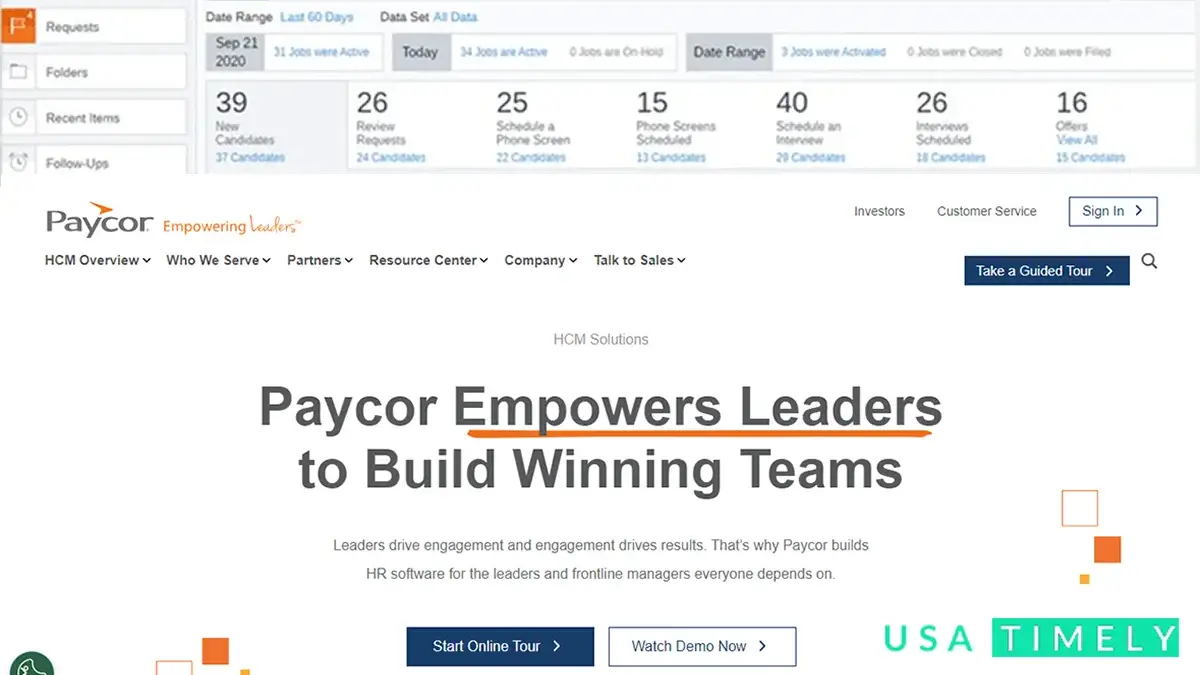
Paycor is a company that provides human resources and payroll solutions, including recruiting, onboarding, reporting, timekeeping and compliance management services, to businesses. It’s known for its software as a service platform which aims to streamline HR and payroll processes.
Paycor Details
Paycor has established itself as a notable player in the HR software industry, especially catering to the needs of small to medium size businesses. The company offers a comprehensive suite of services that streamline various HR processes such as payroll management, onboarding, performance review cycles and PTO management. Its cloud-based system is praised for its user-friendly interface, which simplifies tasks for its users and its commitment to compliance management, which aids businesses in adhering to regulations and managing risks.
If you are eager to transform your workforce management than Smart Square HMH might the best option. It helps you schedule and manage the healthcare operations.
However, it’s worth noting that while Paycor is lauded for its efficiency and the simplicity of its core functionalities, it might have limitations when it comes to customization. This could potentially make it less suitable for businesses with very specific needs or those looking for advanced HR functionalities. Additionally, some users have reported challenges with customer support, which could be a consideration for companies that prioritize high levels of service and support.

Paycor could be an excellent fit for companies seeking straightforward, essential HR functionalities with an emphasis on compliance and user-friendly experiences. Larger enterprises or those in need of highly customizable or advanced features might need to weigh these considerations carefully.
What is Paycor Login?

The Paycor login page is a secure access point for employees to sign in to their Paycor accounts. On the login page, you will typically find fields to enter your username and password. If you have forgotten your username or password, there are usually links to help you recover or reset them. Additionally, some organizations may enable signing in with Single Sign-On (SSO), which allows you to use one set of login credentials for multiple applications.
Paycor Login Process
Here’s a simplified overview of the Paycor login process:
- Navigate to the Paycor Secure Access Employee Login page. You can find it at https://secure.paycor.com.
- Once the page loads, locate the login fields.
- Enter your Username in the designated field.
- Enter your Password in the next field.
- Click the “Sign In” button to access your Paycor account.
- If you encounter any issues or have forgotten your login credentials, look for links like “Forgot your username?” or “Forgot your password?” to initiate recovery procedures.
- Follow the on-screen instructions, if you’re using any additional authentication methods required by your organization, such as Two-Factor Authentication (2FA).
Paycor Recruitment
Paycor Recruiting is a modern, intuitive and comprehensive recruitment solution designed to help organizations streamline their hiring process, from job posting to onboarding.
Recruiting an employee might seem straightforward but in reality, it’s more complex. With USA Timely, learn How to Recruit New Employees?
Here’s a general overview of what features and benefits such a system might include, based on the nature of recruiting platforms:
- Job Posting and Distribution: Allows users to create job postings and distribute them across multiple job boards and social media platforms to maximize visibility.
- Applicant Tracking System (ATS): Provides an organized way to track all applicants through each stage of the hiring process, from initial application to final decision.
- Candidate Screening: Automates the screening process with customizable questionnaires, assessments, and scoring systems to quickly identify top candidates.
- Communication Tools: Facilitates communication with candidates through integrated messaging systems, keeping all correspondence in one place.
- Interview Scheduling: Offers tools for scheduling interviews, including calendar integrations, to simplify the coordination of interview times between hiring teams and candidates.
- Collaborative Hiring: Enables team collaboration by allowing multiple team members to review, comment on and rate candidates, fostering a more inclusive decision-making process.
- Analytics and Reporting: Provides insights into the recruiting process with analytics and reporting tools, helping organizations identify bottlenecks and improve their hiring strategies.
- Onboarding: Seamlessly transitions successful candidates into the onboarding process, ensuring a smooth and welcoming start to their new position.
Paycor Recruiting is designed to make the recruitment process more efficient and effective, helping organizations to attract, identify and onboard top talent.
Business people frequently switch jobs in order to advance their careers and receive better pay and benefits. Obtaining business certifications is an excellent method for assisting with this shift. With us, you can get detailed insights about your career and business to make the correct decisions.
Keep growing with USA Timely!
Business
How to Recruit New Employees?

Intro
Recruiting an employee might seem straightforward: post a job online, interview candidates and hire. But in reality, it’s more complex. Your employees are crucial to your business—they can make or break it. To recruit top talent effectively, it’s important to understand what recruitment is and how it works.
What is recruitment?
Recruitment is the process of finding, screening, interviewing, and selecting candidates for a job opening in an organization. It also involves hiring and on-boarding the chosen candidates. Companies recruit new employees to fill newly created positions or to replace employees who have left or moved to different roles. They can use recruitment software or seek help from external agencies to find qualified candidates.
What are the different types of recruitment?
There are two main types of recruitment: internal and external.
- Internal recruitment involves looking within your company’s current workforce for potential candidates. This can include asking for referrals from employees, promoting from within, or transferring employees between locations if you have multiple business sites.
- External recruitment, on the other hand, involves seeking candidates from outside the company. This can be done through strategies such as advertising on job boards, posting on your company’s website and social media platforms, and establishing connections with educational institutions. Many employers find it effective to use a combination of these strategies for recruitment.
“Did You Know?
Although both internal and external recruitment are effective, Jobvite reports that internal referral hires have higher employee retention and job satisfaction rates than external hires.”
Who handles recruiting?
Recruiting is typically managed by experienced professionals who understand the importance of the process. The individuals responsible for recruiting in your organization will depend on factors such as the size of your company and the resources available.
In a small business, recruiting and hiring responsibilities may fall to the hiring manager, who will also oversee the new hire. If there is an in-house human resources (HR) department or HR manager, they will screen candidates and collaborate with the hiring manager to make final selections.
If your company lacks internal resources for recruitment, you can seek external assistance.
Sarah Dewey, a talent sourcer at Meta, suggests, “If your company doesn’t have the bandwidth to support all of their open recommendations, a recruitment technique they can adopt is to work with an agency to fill roles more efficiently.”
Companies with recruitment agency partnerships or internal recruiters are well-equipped to delegate recruiting tasks. While recruiters may consult with HR or hiring managers, they primarily handle tasks such as posting jobs, sourcing candidates, screening applicants, negotiating salaries, and facilitating placements.
“Important: When deciding on the type of person you want, consider the benefits and drawbacks of hiring a seasoned professional versus a fresh college graduate.”
What does recruitment involve?
The recruitment process can vary depending on the business or the specific role you’re hiring for. However, it typically involves six main steps: defining the open position, sourcing job applicants, screening potential candidates, interviewing qualified candidates, selecting a candidate and extending an offer, and onboarding new hires.
Defining the Open Position
Before you start looking for candidates, it’s important to clearly define the role you want to fill. This includes understanding the key responsibilities the position entails, outlining specific qualifications required, deciding on an anticipated start date, determining the salary range, and clarifying the reporting structure. Writing a clear job description and preparing a set of standard interview questions can help streamline the hiring process.
Sourcing Job Applicants
The next step in the recruitment process is to find job applicants. You can do this by hiring a recruiter or recruitment agency to help you, asking your employees or trusted colleagues for referrals, or using various methods such as posting the job on your company website, job boards and social media.
There are two types of job applicants: active candidates who apply directly to the job, and passive candidates who are qualified but haven’t applied. If you’re reaching out to a passive candidate, you’ll need to adjust your recruiting strategy based on their current level of interest in your company.
According to Joe Mullings, candidates fall into three engagement categories:
- Those who know you and will engage because of an existing relationship.
- Those who may not know you but have been referred or are familiar with your company.
- Those who are not familiar with your company and will need more information about your brand.
Screening Potential Candidates
Once you start receiving applications, it’s important to filter them to find qualified candidates. Review resumes and cover letters, and conduct a brief phone screening for candidates who seem like a good match. Ask each candidate the same set of screening questions to assess their qualifications. Select the most qualified candidates to move on to the interview process.
For applicants who don’t meet your criteria, thank them for their time and inform them that you won’t be moving forward with their application. It’s better to communicate this than to leave them wondering.
“Be responsive and maintain positive relationships,” says Dewey. “Even if a candidate isn’t a fit now, they might be in the future.”
Interviewing Qualified Candidates
The next step in the recruitment process is interviewing qualified candidates. The hiring manager will conduct interviews with potential candidates, asking them competency-based questions to assess their skills and fit for the team and company culture. This stage may include one or more rounds of interviews. It’s also important to contact the candidate’s references during this phase to gather additional insights.
Selecting a Candidate & Extending an Offer
After interviewing and evaluating candidates, select the one you believe is the best fit for the position. Prepare an offer letter and extend it to the chosen candidate.
During this stage, consider conducting a criminal background check. Ensure that your offer letter states the job offer is contingent on the results of the background check, and comply with all federal and state laws.
Inform the candidates who were not selected that you have chosen another candidate, and thank them for their time. It’s important to maintain a positive relationship, as you may consider them for future opportunities.
On-boarding New Hires
Once a candidate accepts your job offer, the final step is the hiring and on-boarding process. Typically, your company’s HR professionals will handle this step to ensure the new employee completes all necessary employment paperwork and is integrated into your business in compliance with labor and employment laws.
What are some recruitment best practices?
As USA Timely explains, choosing employees wisely is crucial as a bad hire can cost your business up to 30 percent of its first-year earnings. However, recruitment is often where employers make mistakes.
According to Mullings, “Your employees are the difference between success and failure, yet the recruitment process that is used is generally ad hoc, rushed, and has little strategy beyond a post-and-pray approach.”
To build a successful recruitment process, you must be strategic. Experts have identified three best practices to help your business recruit top talent.
Communication
Clear communication is key during the recruitment process. It’s important to ensure that recruiters, HR professionals, hiring managers, and job applicants are all on the same page. This includes posting accurate job descriptions, specific business certifications, promptly responding to applicants (whether it’s a yes, no, or an update) and keeping all parties informed about the status of each candidate.
The “Hum, Sing, Shout” method
Employee recruitment is an ongoing process that happens multiple times throughout a company’s lifespan. Therefore, it’s essential for employers to brand their hiring process to attract and hire top talent when needed.
Mullings recommends using the Hum, Sing, Shout method to differentiate your company from others in the recruitment process and attract the right candidates. Here’s how it works:
- Hum: Keep your hiring brand active in the marketplace. This means consistently advertising, networking, and using appropriate branding strategies on social media platforms that align with your company and industry.
- Sing: Make your company and your efforts to find talent visible to job seekers. Even if you’re not actively hiring at the moment, you’re still engaging with a wide pool of potential candidates.
- Shout: When you’re ready to hire, make some noise. Use social media, job boards, and your network to quickly fill the open position. Highlight why someone would want to join your team and how they would benefit from working with your organization.
Tracking candidates
It’s crucial to track candidates throughout the entire talent acquisition process. Whether you use HR software, an applicant tracking system, or another method, having a standardized approach ensures that no candidate is overlooked and no detail is missed.
Here are some top choices for HR software with recruiting and onboarding capabilities:
- Paychex Flex: This software allows you to publish job openings to top career sites and social media platforms directly from the dashboard. Paychex Flex also offers background check services to screen applicants before hiring them.
- BambooHR: BambooHR helps you manage all stages of the employee life cycle, from recruitment to offboarding. You can post and track job openings, distribute them via social media, review and rate candidates, and send offer letters and new-hire documents with electronic signature capabilities.
- Rippling: Rippling is known for being easy to implement, with the ability to onboard new hires in just 90 seconds. The software allows you to customize and automate the onboarding process, run candidates through background checks, and conduct e-verification.
According to Dewey, “Do your due diligence and make sure you’re keeping track of what’s going on in your pipeline. This helps you see your progress and areas for improvement. Keeping track of all your candidates and their stages (along with your data) will save a lot of sanity when hiring managers ask for reports.”
If you making a shift in business OR moving to new office than you must read USA Timely’s Office Leasing guide.
Business
Who Owns Amazon? 10 Major AMZN Shareholders 2024
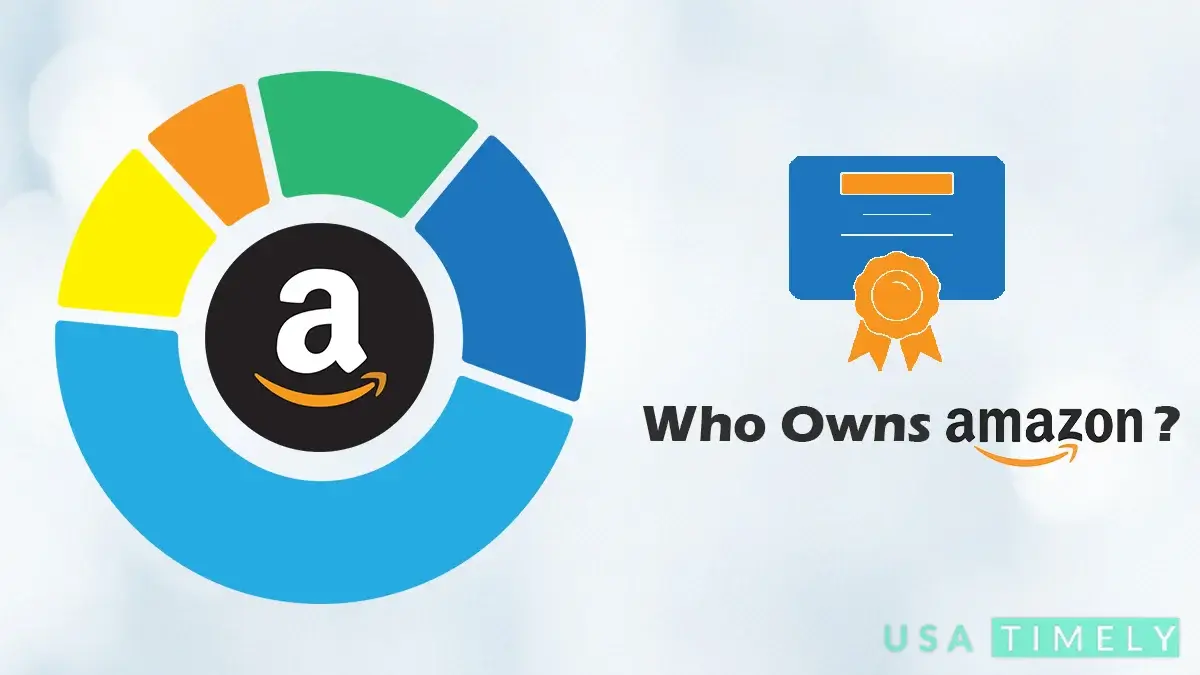
Billionaire Jeff Bezos and Lauren Sanchez are not the only focus of media attention. People are also interested in whether Bezos will sell more of his Amazon shares soon. On November 15 and 16, 2023, Bezos surprised the market by donating 1.67 million shares to a nonprofit, according to an SEC filing.
CNBC reported on November 21, 2023, that Bezos, the world’s third-richest man, might sell up to 10 million shares, which is worth more than $1 billion.
Although Bezos currently owns over 988 million AMZN shares, his ownership has declined significantly since 1998, a year after Amazon became a publicly listed company.
In this USA Timely article, we’ll explore who owned Amazon in 2023 and who the largest shareholders of Amazon are in 2024.
Key Facts
- Jeff Bezos’ ownership of Amazon decreased to under 10% in 2023, from his initial 41% stake in 1998.
- Amazon’s board of directors and officers generally hold relatively minor ownership stakes compared to institutional investors, despite being influential in the company.
- The company’s ownership structure has evolved significantly, with early investors like Jeff Bezos’ parents and L. John Doerr playing key roles.
- Investment management firms and asset managers acquired substantial stakes in Amazon in the early 2000s, with Legg Mason and TWC Group among the early contenders.
- Amazon’s major institutional investors, including Vanguard, Blackrock, and State Street, collectively hold a large portion of the company’s stock.
Analyze Amazon’s ownership structure
Let’s take a closer look at how Amazon’s ownership and ownership structure have evolved over the years before we explore who the current owners of Amazon are.
Evolution of Amazon’s Ownership
Amazon Founder & Early Individual Investors
Jeff Bezos, the founder and owner of Amazon, was a pioneer in the startup world long before it became popular.
Jeff Bezos’ Parents’ Investment
During Amazon’s 1998 Annual Meeting of Stockholders, it was revealed that Jeff Bezos’ parents were among the initial investors in the company. This investment phase is often referred to as the ‘pre-seed funding stage’ in startup circles, where funding typically comes from friends and family of the founder.
The Los Angeles Times reported in 2015 that Jackie and Miguel Bezos invested $245,000 into their son’s fledgling startup. By the time of the 1998 stockholders meeting, the couple held 1.57 million shares, representing 6.5% of the company’s total outstanding stock.
Early Investment from John Doerr & Kleiner Perkins
John Doerr, chairman of the venture capital firm Kleiner Perkins, was another early investor in Amazon. At that time, Doerr and Kleiner Perkins held stakes of 12% and 11.4%, respectively.
Influence of Tom A. Alberg
Tom A. Alberg, co-founder of the venture capital firm Madrona, played a crucial role in convincing investors to fund Amazon. His guidance was instrumental in Amazon’s transformation into the world’s largest e-commerce company, with a market capitalization of nearly $1.5 trillion.
Alberg, who passed away on August 5, 2022, served on Amazon’s board for 23 years. His contributions were pivotal to Amazon’s success.
“Tom is best known for his early investment in Amazon, which occurred in 1995, when buying anything online was thought hazardous and unlikely to succeed. Working with Jeff Bezos and the Amazon team, he helped establish one of the world’s largest and most successful enterprises.”
Amazon’s Institutional Investors
Amazon’s shareholder composition has undergone significant changes as it evolved into an e-commerce powerhouse.
In the early 2000s, investment management firms and asset managers emerged as prominent owners of Amazon. By the end of March 2001, the American investment management firm Legg Mason had become the second-largest shareholder in Amazon, holding a 14.67% stake, second only to Bezos.
This trend of investment firms acquiring substantial stakes continued, with TWC Group following Legg Mason’s lead in 2004.
In 2007, ownership of Amazon began to shift towards fund managers, with Smith Barney Fund Management, later rebranded as Morgan Stanley Wealth Management in 2012, acquiring a stake. The following year, the asset manager T Rowe Price Associates also became a shareholder, securing a 5.10% stake in Amazon.
However, it wasn’t until 2017 that Blackrock and Vanguard, two of the world’s largest asset managers, entered the top ten shareholders of Amazon. They have continued to be among the largest Amazon shareholders since then.
Amazon’s Ownership Structure
Over the years, Amazon’s shareholder base has become more diverse, including institutional, individual, retail, and insider investors.
According to Nasdaq, Amazon has a total of 10.33 billion outstanding shares. Wall Street Zen reports that institutional investors—entities like mutual or pension funds, insurance companies, and investment firms—own 58.6% of Amazon’s total common outstanding shares.
Retail investors hold 31.77%, while insider or individual shareholders, including Jeff Bezos and company directors, own about 9.6%.
Compared to other internet retail peers, Amazon has the second-highest proportion of institutional shareholders. In contrast, the Argentinian internet retailer Mercado Libre (MELI) leads with 79.20% of its shares held by institutional investors. Wall Street Zen’s data shows that individual shareholders hold just over 3% of MELI stock.
Wall Street Zen data indicates a markedly lower level of institutional ownership in two Chinese e-commerce giants. Institutional investors hold only 1.72% of Alibaba’s shares and 7.07% of JD.com’s shares.
“Corporations with a large proportion of institutional shareholders are frequently considered good investments. Before investing in a stock, large institutional shareholders perform extensive research and analysis, which frequently includes a team of pricey analysts.
Because of their cautious approach, they rarely acquire or sell stocks in haste. As a result, their investing selections frequently serve as a benchmark for other prospective investors.”
Who owns Amazon?
As Amazon stockholders continue to shift, let us look at who owned Amazon in 2023 and who owns it currently.
How Much of Amazon Does Jeff Bezos Own?
As of March 31, 1998, a year after Amazon went public, Jeff Bezos owned 41% of the total 24.16 million shares of common stock, making him the largest shareholder.
Over the next thirty years, Bezos gradually sold off some of his Amazon shares to fund other projects, such as his space company Blue Origin, and for charitable donations. He established two charitable organizations:
- The Bezos Earth Fund, which supports environmental non-profits.
- The Bezos Day One Fund, which provides grants to help homeless families and low-income communities.
By 2008, his stake in Amazon had decreased to 23.81% of the then 417.38 million outstanding shares, or 99.32 million shares.
As of February 25, 2019, Bezos held 16% of Amazon’s total 491.75 million outstanding shares. Following his divorce from Mackenzie Scott in 2019, he transferred a 4% stake to her, leaving him with a 12.7% ownership as of February 2022.
Throughout most of 2022, Bezos maintained this level of ownership until he began aggressively selling shares in 2023.
“FYI: As of December 2023, Nasdaq reported that Jeff Bezos held approximately 9.56% of Amazon. This represents around one-quarter of his total holding in 1998. Even if he owns less than 10% of Amazon, Bezos remains the company’s largest shareholder in early 2024.”
Who is on Amazon’s Board of Directors & what are their stakes?
Amazon’s board of directors comprises eleven members, including Jeff Bezos and the Chief Executive Officer, Andrew Jassy. Directors are elected at each Annual Meeting of Shareholders and serve until the next meeting or until their successors are elected.
While members of Amazon’s board of directors and its officers do own company shares, their holdings are relatively minor compared to major shareholders.
Andrew Jassy

Andrew Jassy has been serving as the President and CEO of Amazon since July 2021, succeeding Jeff Bezos. He owns 2.13 million shares of Amazon, representing 0.02% of the company’s total outstanding stock, making him the second-largest individual investor in Amazon after Bezos.
Douglas J. Herrington
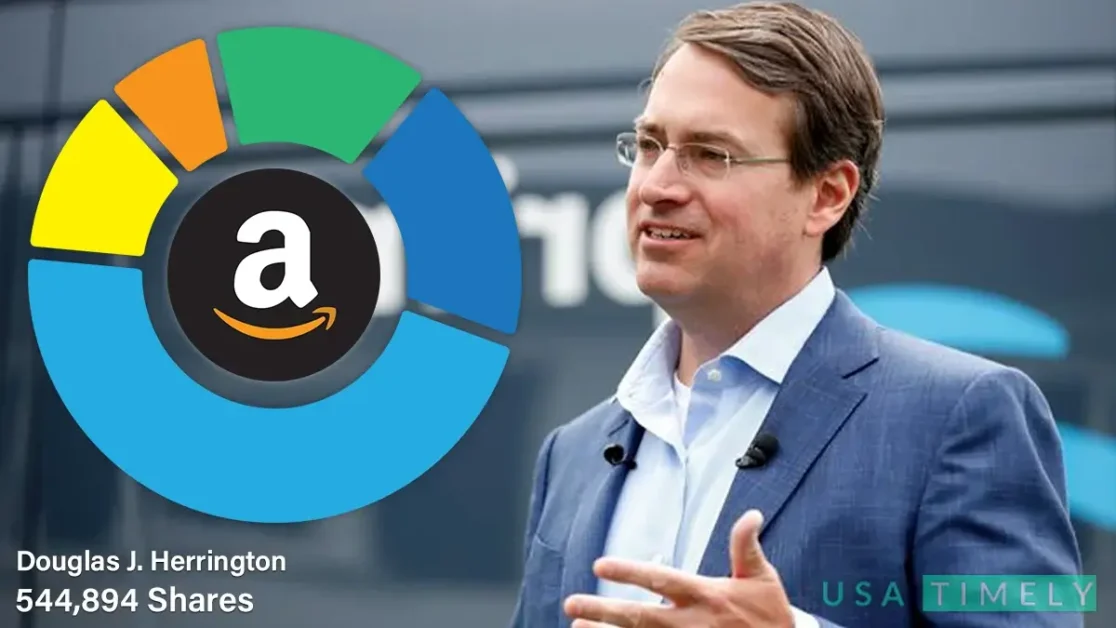
Herrington has been with Amazon since 2005 and took on the CEO role of Worldwide Amazon Stores in July 2022. He holds 544,894 Amazon shares, potentially making him the third-largest individual shareholder in the company.
Jonathan J. Rubinstein
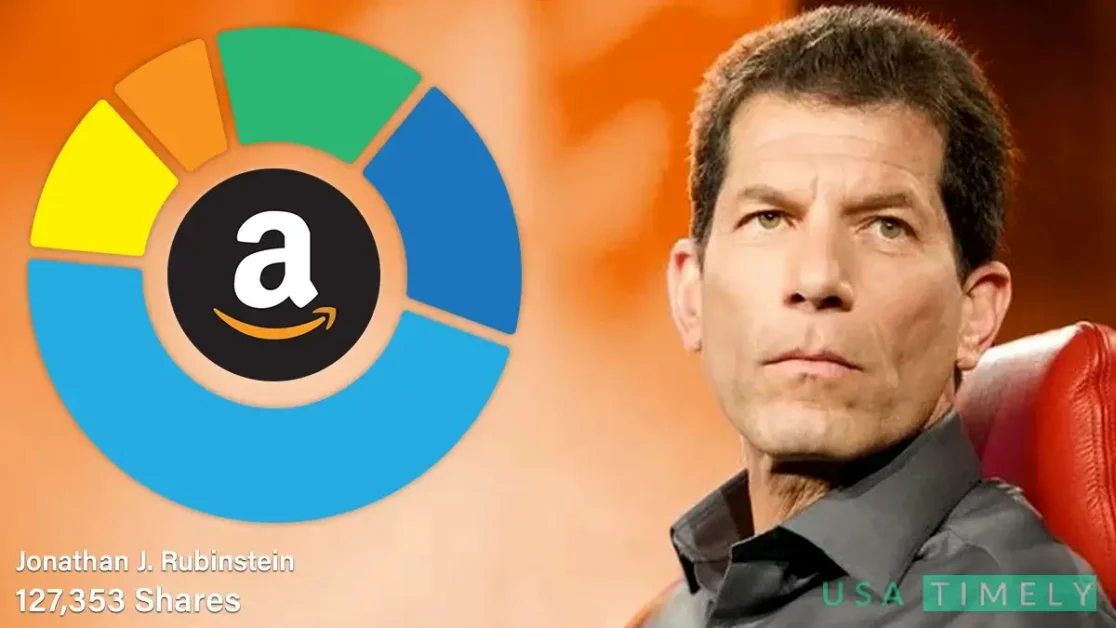
Rubinstein, a former co-CEO of Bridgewater Associates, has been a director of Amazon since December 2010. He owns 127,353 Amazon shares, valued at approximately $20.08 million based on the closing price of January 28, 2024.
Shelley Reynolds

Reynolds has been Vice President, Worldwide Controller, and Principal Accounting Officer at Amazon since 2007. As of November 20, 2023, she owned 122,436 shares in Amazon, valued at approximately $19.31 million based on the closing price of January 28, 2024.
Adam Selipsky
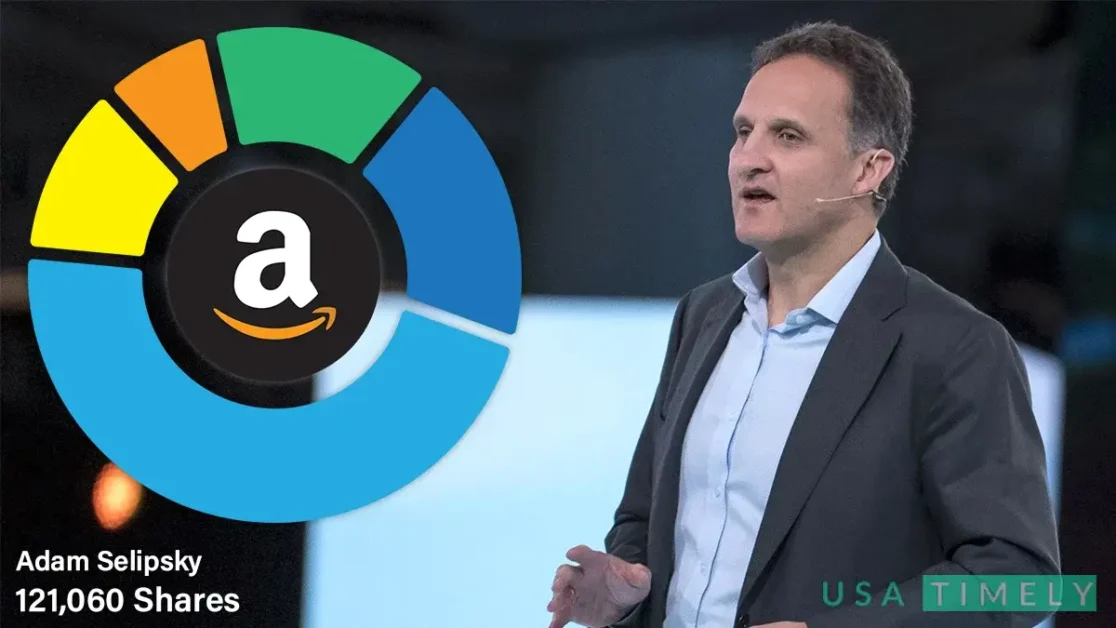
Selipsky leads AWS, the world’s most comprehensive and broadly adopted cloud platform. As of November 21, 2023, he owned 121,060 shares in Amazon.
Who owns the most Amazon shares?
Here’s a list of the top shareholders of Amazon and their respective stakes:
| Shareholder | Shares Owned (Millions) | % Ownership |
| Jeff Bezos | 52.5 | 9.56% |
| Vanguard Group Inc | 757.95 | – |
| Blackrock | 613.38 | 5.94% |
| State Street Corporation | 332.44 | 3.20% |
| FMR (Fidelity Investments) | 302.10 | 2.92% |
| Vanguard Total Stock Market Index Fund (VTSAX) | 290.66 | 2.80% |
| Vanguard 500 Index Fund (VFIAX) | 219.26 | 2.10% |
| T. Rowe Price Associates Inc | 207.78 | 2.00% |
| Geode Capital Management LLC | 176.2 | 1.71% |
| JP Morgan Chase & Co | 157.13 | 1.52% |
FAQs
Does Jeff Bezos still own Amazon?
Yes, Jeff Bezos still owns Amazon, but his share ownership has decreased over time. Currently, he has less than a 10% stake in the company.
Who owns most of Amazon’s stock?
Jeff Bezos remains the largest shareholder of Amazon, although his ownership is now less than 10%. Other significant shareholders include prominent asset managers and investment firms like Vanguard, Blackrock, and State Street.
What is Jeff Bezos’s net worth?
Jeff Bezos has a net worth of $169.2 billion as of December 8, 2023, making him the world’s third-richest person. His net worth hit a low of $113 billion in 2020 during the COVID-19 pandemic but reached a peak of $177 billion in 2021.
Who owns Amazon now?
As of January 2024, Jeff Bezos remains Amazon’s largest individual shareholder, followed by Vanguard Group, the company’s largest institutional shareholder.
Business people frequently switch jobs in order to advance their careers and receive better pay and benefits. Obtaining business certificates is an excellent method for assisting with this shift.
Final Bite
While Jeff Bezos is Amazon’s largest shareholder, his position is projected to decline further over time.
Nonetheless, as the company’s creator, Bezos is likely to have a substantial influence over the company’s future course.
-

 Celebrity6 months ago
Celebrity6 months agoMisty Severi – The Breaking News Reporter
-

 Technology6 months ago
Technology6 months agoIntegremos, What is it? Complete Information
-

 Celebrity6 months ago
Celebrity6 months agoBeth Grosshans Husband: Robert Smith
-

 Celebrity5 months ago
Celebrity5 months agoWho is Dr. Zena Al-Adeeb?
-

 Business6 months ago
Business6 months agoBoeing Struggles For Trust Amid Quality Lapses
-
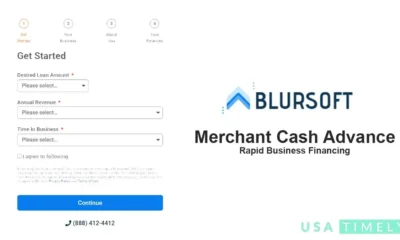
 Finance6 months ago
Finance6 months agoMerchant Cash Advance Blursoft: Rapid Business Financing
-

 Health6 months ago
Health6 months agoKorps Sukarela: Detailed Information
-

 Entertainment6 months ago
Entertainment6 months agoQuentin Tarantino and Brad Pitt Reunite for The Movie Critic



